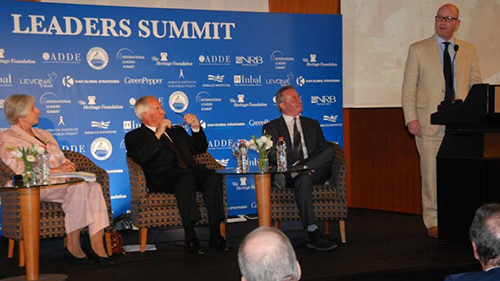Leadership Summit Highlights Importance of Middle East for Americans, Europeans
Conference focuses on rule of law as basis for civil society
[Jerusalem] – Alarmed by the impact of “crumbling” Middle Eastern nations on Europe and the United States, and convinced that the devolving situation demands an affirmation of common civilization by those threatened, 150 participants from the United States, Israel, Europe and New Zealand spent two days reviewing the growing gap that distinguishes those committed to freedom, the rule of law and private property rights and relating the common challenges to the Middle East and the bases of the US-Israel relationship.
The Jerusalem Leaders Summit met for two days with an eye toward taking the sessions back to Washington in order to distribute their content through targeted marketing to people and institutions, teaching what the common bonds are and providing them with a “basis for further discussion, further research and further knowledge of the United States – Israel bonds,” Becky Norton Dunlop, Vice President of the Heritage Foundation, an organizer of the event, told The Media Line.
Other organizers include the International Leaders Summit, the model for the event; National Religious Broadcasters, the umbrella organization uniting thousands of Christian broadcast entities; Family Research Council; and Alliance for Defence of Democracy in Europe (ADDE).
In a departure from the format used by countless conferences espousing support for the state of Israel, the Jerusalem Leaders Summit articulated freedom, the rule of law and existence of rigorous private property rights as the threshold for membership among the civilized. Session moderator Steve Linde, executive editor of the Jerusalem Post, deftly managed a passionate Q-and-A when some attendees seemed impatient to move from the theoretical understanding to discuss the topic’s application to Israel.
The applications were soon to come, with speakers focusing on the four areas chosen as symbolic of the sound underpinnings of the relationship between the two nations. “We understood there are serious challenges in the Middle East and we are here to affirm our ties, our partnership with Israel,” Joel Anand Samy organizer and co-founder of the Summit told The Media Line. He expressed concern that Israelis wonder whether they can still trust the United States following the raucous relations during the Iran nuclear debate.
According to Dunlop, Israel and the United States are bound by the concept of economic freedom; the shared need for a strong commitment all the fire to security and defense; the rule of law and property rights (which we were to learn is shorthand for “life, liberty and private ownership); and innovation, an area in which Israel has excelled far beyond nations much larger.
Participants pulled no punches in relation to the threat posed by radical Islam. Dr. Jerry Johnson, president and CEO of the National Religious Broadcasters declared that “the two world views (Islam and democracy) cannot peacefully exist without compromise…and Sharia law just does not allow for the state of Israel.”
Despite the strong support for Israel expressed by the speakers at the Inbal Hotel, the main source of concern was the mass influx of Syrian refugees into the European countries and beyond. Calling for “discernment and good intel” to guide decisions by the governments and to protect the populations, Johnson argued that even if the figure of “only one out of fifty” being sympathetic to the Islamic State (ISIS), “that would mean thousands” of ISIS supporters are finding their way into the European nations.”
“In Belgium, one of the most tolerant societies, has the highest number of ISIS fighters,” Mischael Modrikamen told The Media Line. He warned that more than 1.5 million refugees are making their way into Germany in 2015 and warned that, “once they are there, they will claim their right for unification which allows them to bring in parents, brothers and sisters…with adds up to 10 million people, 15% of the German population.”
The Jerusalem Leaders Summit took note of the US presidential election cycle underway and expressed its intention to be a resource for the candidates and impact on issues relating to the Middle East. According to Johnson, “Foreign policy is key to the presidential race, certainly in the news. Christian people need to think about America and Israel, America and the Middle East. We thought about coming over and highlight the issues.”
